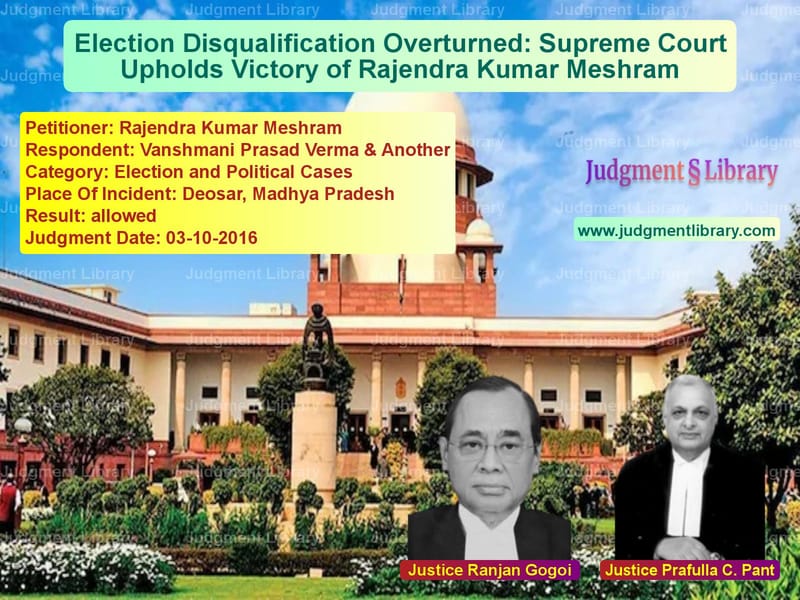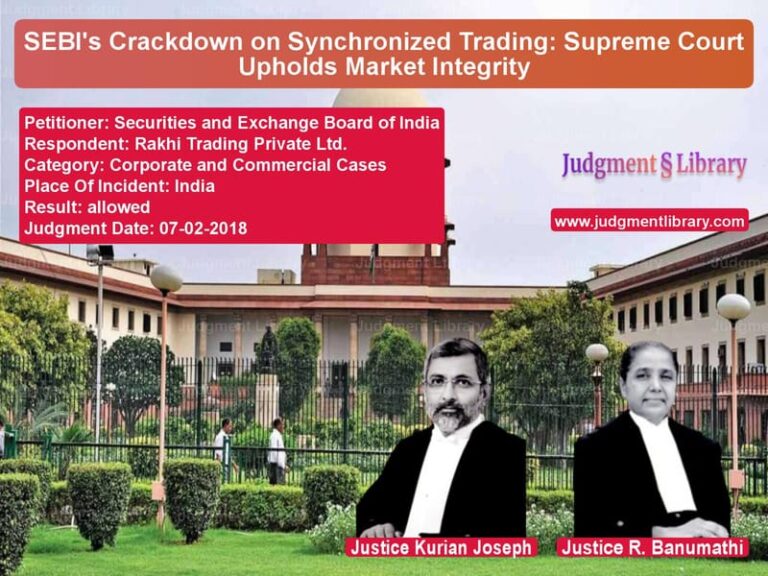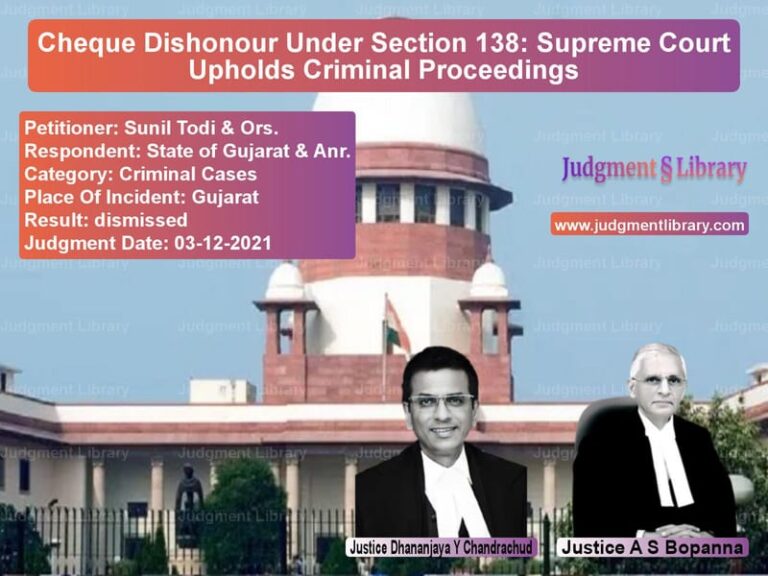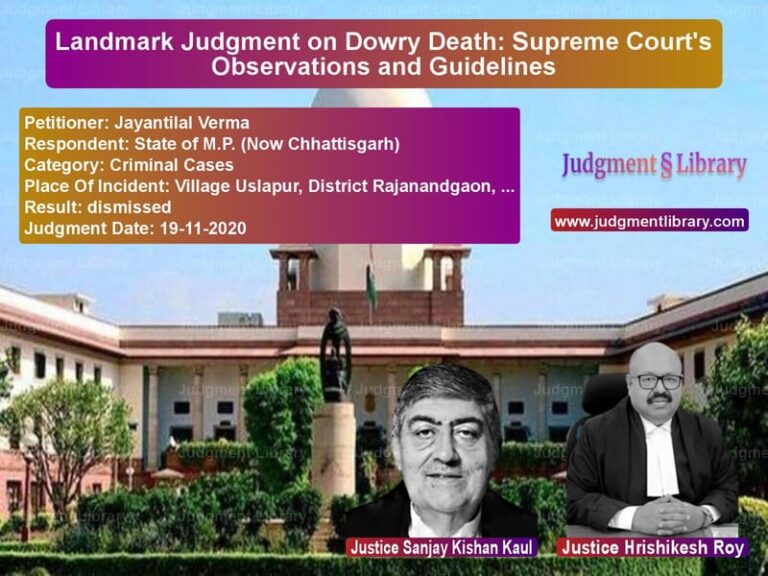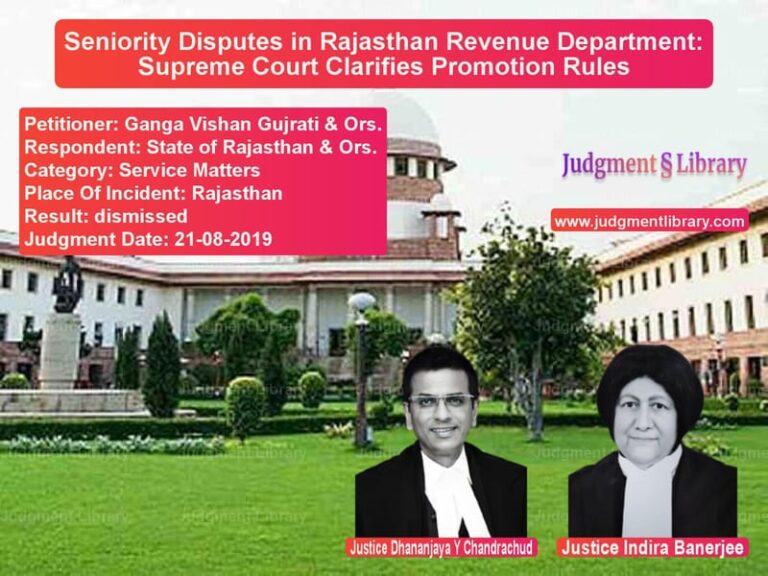Election Disqualification Overturned: Supreme Court Upholds Victory of Rajendra Kumar Meshram
The Supreme Court of India, in the case of Rajendra Kumar Meshram v. Vanshmani Prasad Verma & Another, delivered a judgment on October 3, 2016, which clarified the legal position regarding disqualification in electoral matters. The case involved the election of the appellant, Rajendra Kumar Meshram, to the Madhya Pradesh Legislative Assembly from the No. 81 Deosar Constituency. His election was challenged by the respondent, Vanshmani Prasad Verma, before the High Court on the grounds of improper acceptance of his nomination form. The High Court declared his election void, prompting the appellant to appeal to the Supreme Court.
The Supreme Court overturned the High Court’s decision, stating that even if the acceptance of the nomination was improper, the election could not be invalidated without proving that the result was materially affected. This judgment reinforces the need for substantive evidence when challenging election results.
Background of the Case
The election for the Madhya Pradesh Legislative Assembly was held on May 11, 2013. The respondent, Vanshmani Prasad Verma, contested as an independent candidate after his nomination as a Congress candidate was rejected due to an alleged delay in submitting the party’s symbol allotment letter.
The respondent later challenged the election of Rajendra Kumar Meshram on three main grounds:
- The rejection of his nomination as a Congress candidate was wrongful.
- The appellant was allegedly a government servant at the time of filing his nomination, making him ineligible.
- The appellant failed to submit a certified copy of the electoral roll of the No. 80 Singrauli Constituency, where he was registered as a voter.
The High Court ruled in favor of the appellant on the first two points but declared his election void on the third ground, leading to the Supreme Court appeal.
Arguments Presented
Petitioners’ (Respondent) Arguments
- The appellant failed to submit the required electoral roll copy, violating Section 33(5) of the Representation of People Act, 1951.
- The improper acceptance of the nomination materially affected the election results, warranting disqualification under Section 100(1)(d)(i) of the Act.
- Since the appellant did not prove his voter registration in Madhya Pradesh, he was ineligible to contest.
Appellant’s Arguments
- The High Court did not examine whether the alleged irregularity in nomination acceptance materially affected the election result.
- There was no finding that the appellant was not a voter in Madhya Pradesh, and the challenge on these grounds was made only during oral arguments.
- The election petition did not explicitly allege that the appellant was disqualified from contesting.
Supreme Court’s Judgment
The Supreme Court ruled in favor of the appellant and restored his election. The key observations made by the Court included:
- On the Material Effect of Nomination Acceptance: The Court held that under Section 100(1)(d) of the Representation of People Act, an election can only be invalidated if improper acceptance of a nomination materially affects the result. The High Court failed to examine this aspect.
- On Qualification of the Candidate: The Court noted that there was no pleading or evidence to establish that the appellant was not a voter in Madhya Pradesh. The challenge was based on a technical requirement that did not establish disqualification under Section 100(1)(a) of the Act.
- On Procedural Requirements: The Court reiterated that failure to attach a certified electoral roll copy is a procedural defect and does not automatically render a candidate disqualified.
The Court held: “The High Court having failed to determine whether the improper acceptance of nomination materially affected the election, was not empowered to declare the election void.”
Legal Precedents Cited
The Court referred to key judgments regarding election disputes:
- Union of India v. Association for Democratic Reforms: Emphasized that election laws must be interpreted to uphold democratic principles.
- Jyoti Basu v. Debi Ghosal: Highlighted that election disputes must be adjudicated strictly within the scope of election laws.
- Rajendra Singh v. State of U.P.: Established that procedural defects must be considered in light of their impact on election results.
Impact of the Judgment
This ruling clarifies that:
- Technical errors in nomination forms do not automatically disqualify candidates. The petitioner must prove that such errors affected the election result.
- Courts must differentiate between procedural lapses and substantive disqualifications. Disqualification under Section 100(1)(a) must be explicitly proven.
- The burden of proof is on the petitioner. Mere allegations without supporting evidence are insufficient.
The judgment upholds democratic integrity by preventing frivolous election petitions based on procedural errors.
Conclusion
The Supreme Court’s ruling in Rajendra Kumar Meshram v. Vanshmani Prasad Verma reinforces the principle that election disputes must be adjudicated based on substantive evidence. It prevents misuse of technical grounds to overturn election results and ensures that voters’ choices are respected.
By emphasizing the necessity of proving material effect on election results, the Court has strengthened legal protections for elected representatives while maintaining the integrity of electoral laws. The decision serves as a guiding precedent for future election disputes in India.
Don’t miss out on the full details! Download the complete judgment in PDF format below and gain valuable insights instantly!
Download Judgment: Rajendra Kumar Meshr vs Vanshmani Prasad Ver Supreme Court of India Judgment Dated 03-10-2016.pdf
Direct Downlaod Judgment: Direct downlaod this Judgment
See all petitions in Legislative Powers
See all petitions in Public Interest Litigation
See all petitions in Fundamental Rights
See all petitions in Judgment by Ranjan Gogoi
See all petitions in Judgment by Prafulla C. Pant
See all petitions in allowed
See all petitions in supreme court of India judgments October 2016
See all petitions in 2016 judgments
See all posts in Election and Political Cases Category
See all allowed petitions in Election and Political Cases Category
See all Dismissed petitions in Election and Political Cases Category
See all partially allowed petitions in Election and Political Cases Category

